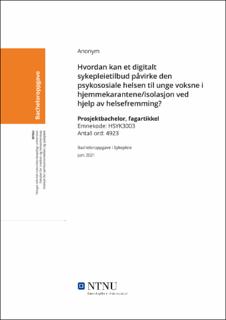| dc.contributor.advisor | Andre, Beate | |
| dc.contributor.author | Higraff, Elise Solem | |
| dc.date.accessioned | 2021-09-25T16:22:58Z | |
| dc.date.available | 2021-09-25T16:22:58Z | |
| dc.date.issued | 2021 | |
| dc.identifier | no.ntnu:inspera:81643445:43198800 | |
| dc.identifier.uri | https://hdl.handle.net/11250/2782882 | |
| dc.description.abstract | Innledning:
Hensikten med dette prosjektet var å undersøke hvordan unge voksne påvirkes psykososialt av hjemmekarantene/isolasjon og hvordan man kan utvikle et digitalt sykepleietilbud for å bistå denne gruppen.
Bakgrunn:
Viruset Covid-19 har ført til en global pandemi, noe som har påvirket mange aspekter i samfunnet. Dette innebærer lockdown og store sosiale begrensninger som hjemmekarantene og isolasjon. Forskning og teori tyder på at dette kan ha en negativ effekt på unges psykososiale og mentale helse.
Metode:
Oppgaven er en kvantitativ kartleggingsundersøkelse som undersøker hvordan unge voksne har hatt det i hjemmekarantene/isolasjon, samt deres bruk av sosiale medier. Undersøkelsen ble sendt ut mars 2021 og analysen ble foretatt ved bruk av nettskjema (UiO) og rapportanalyse.
Resultat:
Resultatet viser til økt ensomhet gjennom karantenetiden/isolasjonen, men også økt ensomhet under selve pandemien. Skjermtiden til unge voksne har gått betraktelig opp, og mye tyder på at dette er en faktor som fører til økt ensomhet.
Konklusjon:
Studiene har vist til en redusert mental helse blant unge voksne. Flere av respondentene kommenterer om manglende tilbud fra helsevesenet. Videre kan studien tyde på at et automatisert digitalt tilbud kan påvirke positivt ved lengre karantene og/eller isolasjonsperioder. | |
| dc.description.abstract | Introduction:
The purpose of this project was to discover how young adults is affected psychosocial by home quarantine/isolation and how it would be possible to develop a digitally nursing service to aid this group.
Background
The pandemic has reign for a year, and it is about time to study how young adults psychosocial sate has been affected. This with lockdowns in mind, but also how they have handled quarantine and/or isolation.
Method:
The assignment is a quantitative survey on how young adults experienced home quarantine and isolation and their use of social media. The survey took place in March 2021 and was analyzed by comparing the respondent’s answer.
Result:
The results show that more and more young adults reports that they are feeling lonelier and more isolated during quarantine and/or isolation. A few commented on feeling lonely the whole pandemic. The survey indicates that adolescents´ screen time had increased, and that this may contribute to an intensified feeling of loneliness.
Conclusion:
The study has shown a decrease in mental health during this pandemic and several of the respondents have commented on the lack of low threshold from the healthcare system. This suggests that an automatic digital healthcare offer might be an important contribution for improving adolescents´ mental health during longer periods of quarantine or isolation. | |
| dc.language | nob | |
| dc.publisher | NTNU | |
| dc.title | Hvordan kan et digitalt sykepleietilbud påvirke den psykososiale helsen til unge voksne i hjemmekarantene/isolasjon ved hjelp av helsefremming? | |
| dc.type | Bachelor thesis | |
